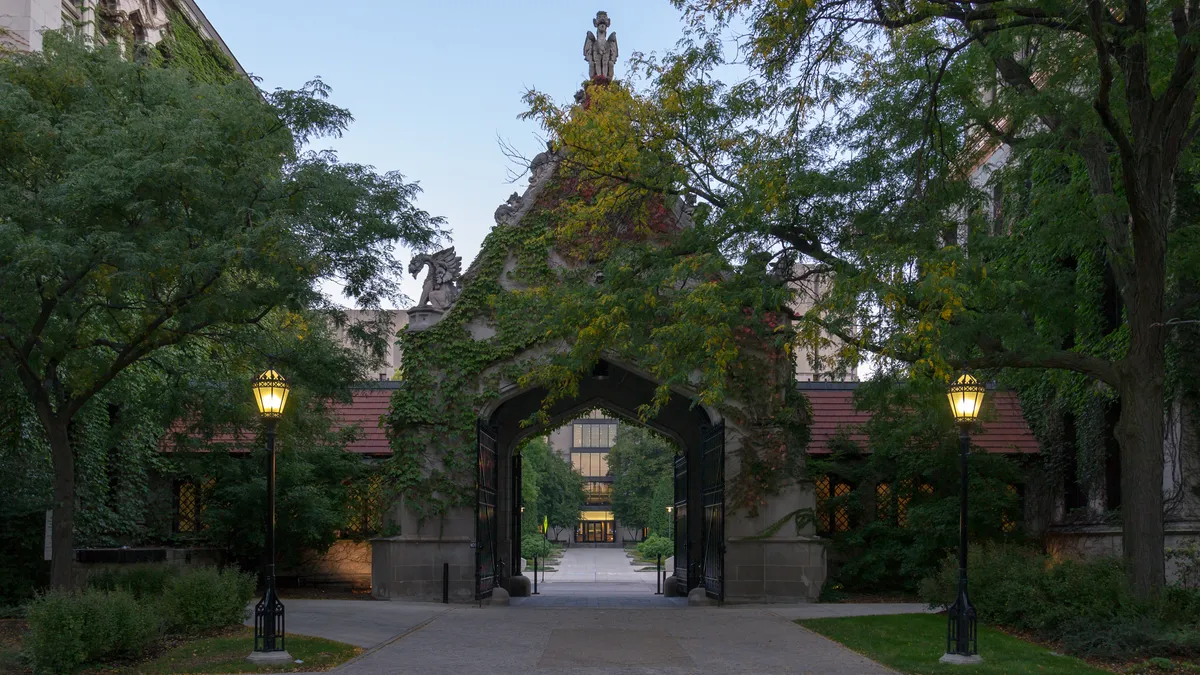John Boyer has served as the dean of University of Chicago’s undergraduate college for the last 30 years. He will transition into a new role as senior adviser to the president at the end of the 2022-23 academic year.
Troubling evidence suggests the public is losing confidence in colleges’ ability to deliver a meaningful return on students’ investment.
Researchers recently found that 56% of Americans think a four-year college degree isn’t worth the cost because graduates often lack specific job skills and have mounds of student debt, according to a March survey conducted by NORC at the University of Chicago for The Wall Street Journal. This is a 16-point increase from 2013, and those aged 18-34 reported the highest levels of skepticism.
This underscores that we cannot simply hand students their degrees and say, “Good luck.” Colleges must proactively help students pave the way from the classroom to their desired careers, just as we help them develop the critical thinking skills that will serve them in all their life’s pursuits.
As dean of the University of Chicago’s undergraduate college for the last three decades, I have seen firsthand how much students benefit from robust career services — and how insufficient career support can negatively impact their college experience.
When I first became dean in 1992, many of our alumni shared that the career support they received from the university had — to put it diplomatically — room for improvement.
Alumni from the ‘70s to the early ‘90s recalled that the only formal career support they received from the college was a single staff member offering them a shoebox full of index cards listing job openings.
We needed to do better. That’s why I made it a priority as dean to create robust internship and professional development programs that would empower students to apply their education to meaningful careers. These strategies helped us go from nearly half of our recent graduates struggling to find opportunities to 98% of the class of 2022 receiving an offer for a post-graduation opportunity.
During this transformation, we’ve found three principles to be particularly important. While each institution is different, my hope is that all liberal arts colleges can benefit from our method.
Create internships instead of finding internships
Internships are one of the best investments that colleges can make to improve student success. A study by the National Association of Colleges and Employers found that students with two or more internships on their resumes are more likely to secure full-time jobs after graduation compared to students who never completed an internship.
To help our students secure these opportunities, the University of Chicago partnered with employers to create a formal university internship program. The Jeff Metcalf Internship Program provides project-based, paid internships in a variety of industries, professions, research settings and locations. In many cases, we have worked with donors to create completely new internship opportunities at their companies. This ultimately benefits the employer as well as our students.
Over the past 25 years, the Metcalf Program has grown from a small pilot with only a handful of internships to an initiative that offers over 4,200 paid internships each year.
The Metcalf Program is especially critical for students pursuing careers in industries and professions where employers often do not have formal recruiting programs, such as the arts, education and nonprofits.
Short-term experiences can have a big impact
When students apply for internships, many find themselves caught in a catch-22. They need internships on their resume to compete for full-time jobs, but many internships require students to have prior experience.
To help students escape this trap, colleges should offer noncompetitive pre-internship advising programs. For example, the University of Chicago provides a job shadowing program that matches students with alumni hosts for one- to five-day experiences. Students visit their hosts’ workplaces, observe their daily projects, and receive career advice from their colleagues.
With programs like these, students can experiment with different careers and meet employers, even if they have no prior experience. They also help students grow their professional networks, find mentors, and get a foot in the door in their target industry.
Colleges can help students gain valuable experience in other settings. Student organizations, course projects, research with faculty and community service all provide substantive experience that students can list on their resume, as do targeted advising programs oriented to specific professions.
Alumni, parents and faculty can be your greatest champions
We found that our alumni are eager to help expand our network of recruiting partners by introducing us to their employers and industry contacts. They have also mentored our students by speaking at career events and coaching students through our online mentoring platform. Members of this trusted network continuously advise our university on how to enhance career services in their areas of expertise.
They have played a critical role at every stage of our career programs. I strongly urge all liberal arts institutions to create pathways for alumni, faculty and parents to share their time, expertise, and talents with students.
The relationship between academic and professional development
Some argue that an inherent tension exists between liberal arts education and career preparation. On the contrary, we have found at the University of Chicago that strong career programs contribute powerfully to the academic experience of our students. In fact, the best way to demonstrate the power of the liberal arts is to have students achieve professional success using the analytical and creative skills they gain in our academic programs.
A system of support has taken shape which draws inspiration from our unique institutional culture, history and structure. Far from competing with the college’s intellectual life, our career advising programs have enhanced our academics by leading our students to test, reconsider and ultimately enrich what they learn in the classroom in applied environments













